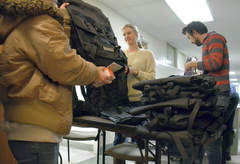By Mary Houlihan

Ron Kaplan and SBK, the family foundation he runs, have been supporting homeless causes for many years. And it was while doing this that Kaplan saw a problem he thought he could help fix.
The consistent thing he observed was people carrying their belongings in worn plastic bags or beat-up suitcases. So he set out to create a useful backpack for the homeless who either move from shelter to shelter or spend the night on the street.
“It’s really a great idea,” says Ed Shurna, executive director of the Chicago Coalition for the Homeless. “It’s not something that will keep people off the streets, but it will make their lives a little more tolerable.”
Thanks to the Citypak Project, 2,000 backpacks were distributed at homeless shelters and other locations last week. The sturdy and versatile bags were designed and manufactured by Gurnee-based High Sierra Sport Company.
“Yes, it will be a very big help,” said Rosemary Howell, 61, who received a pack last week at Catholic Charities’ downtown location. “I need it because I’m disabled, and carrying more than one item is very difficult.”
Stanley Cole, 52, explored the pack’s features and added, “We need more people to be creative like this.”
Kaplan, 61, is the co-founder of Monterey International, a music-booking agency with a roster that includes Van Morrison, Bonnie Raitt, Los Lobos, Buddy Guy and David Lee Roth. He would often see people carrying their belongings “in unpractical ways” as he commuted by bike from his Bucktown home to his downtown office.
After researching the idea to see if it already had been done (it hadn’t as far as he could tell), Kaplan turned to Shurna for help with the design. They showed a group of homeless people an early design of the backpack, asking them what they could do to make it more useful. Ideas flowed.
After several revisions, High Sierra designers created the final design. The pack is made of ballistic nylon, a sturdy material that resists abrasion and tearing. Among the features are a large waterproof main compartment with a secure closure, several easily accessible outer pockets, a place for a name, a poncho that goes over pack and person, a water bottle pocket and a tether to discourage stealing when the carrier is asleep.
“Even if they spend a night in a shelter, they have to leave the next day and can’t come back until night,” Kaplan said. “They have to take everything they own with them. With everyone’s help we created a design that will keep it all safe, from clothes to important documents.”
When they ran the backpack idea past shelters and other organizations, the response was overwhelmingly positive. “It’s normal to get donations of clothes and food but not backpacks, much less a well-made, useful bag,” Shurna says.
The first run of the backpacks was funded by SBK, which has made donations to Habitat for Humanity’s Musician’s Village in New Orleans, MusiCares, Rock for Kids and Camp Heartland. Phase two of the project is to design a bag for the public; for each one sold, one will be given to the homeless. Kaplan also likes the idea of having Chicago artists add designs to the packs.
“What’s interesting is that this idea is getting out there,” Kaplan says. “People from other cities are calling and asking how they can get the packs. We want to keep Citypak alive in Chicago and hopefully grow it to other cities.”
To find out more about Citypak or to make a donation, go to citypak.org.
